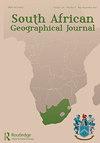津巴布韦东部农村和城市社区的气候智能型生计战略:一项深入的文献研究
IF 1.4
4区 社会学
Q3 GEOGRAPHY
引用次数: 3
摘要
在社区实施气候智慧型生计战略对于减少气候冲击的影响至关重要。虽然社区容易受到气候变化的影响,但脆弱性的大小取决于所实施的生计战略的选择。本文采用现实主义综合方法对同行评议的有关非洲南部特别是津巴布韦东部实施的气候智能型生计战略的文献进行了评估。对所有气候变量进行了全面分析,以充分评估农村和城市社区在微观层面的适应策略。因此,本综述对脆弱性进行了细致入微的分析,构建了社区生计受到日益增加的气候变化和极端事件影响的背景。该审查强调,涉及林业、作物和畜牧业的农业是农村社区的主要生计,而作物种植和小买卖是城市社区的核心生计,在非正规经济中占主导地位。文献证实了农业向气候智能型实践的转变,这些实践可提高生产力并增强生计的复原力。然而,气候智能型农业实践并不是全新的概念。大多数社区一直采用各种非正统的耕作方法来应对气候变化的影响和引起的粮食不安全。在适当的资金、技术和政策支持下,社区有能力制定因地制宜的气候智慧型生计战略。从根本上说,该报告建议公共和私营机构应该发展评估气候相关情景对弱势社会群体影响的能力,使他们能够制定可获得银行支持的生计项目。本文章由计算机程序翻译,如有差异,请以英文原文为准。
Climate-smart livelihood strategies in rural and urban communities in eastern Zimbabwe: an in-depth literature study
ABSTRACT Implementation of climate-smart livelihood strategies in communities is central to reducing impacts of climate shocks. Although the communities are vulnerable to climate variability, the magnitude of vulnerability depends on the choice of livelihood strategies being implemented. This paper applied a realist synthesis method to evaluate peer-reviewed literature on climate-smart livelihood strategies pursued in southern Africa in general and eastern Zimbabwe in particular. A holistic analysis of all climate variables was applied to adequately assess rural and urban communities’ adaptive strategies at micro-level. Accordingly, this review gave a nuanced analysis of vulnerability that frames the context in which communities’ livelihoods are affected by the increasing climate variability and extreme events. The review highlighted agriculture that involves forestry, crop and livestock farming as the predominant livelihoods in rural communities while crop farming and petty business dominates the informal economy as the core livelihoods in urban communities. Literature established the transformation of agriculture to climate smart practices that increase productivity and enhance the resilience of livelihoods. However, climate smart agriculture practices are not entirely new concepts. Most communities have always engaged in a variety of unorthodox farming methods to combat the impacts of climate variability and induced food insecurity. Given the right financial, technical and policy support, the communities are capable of constructing climate-smart livelihood strategies that are context specific. Fundamentally, the paper recommends that public and private institutions should develop capabilities to assess the impacts of climate related scenarios on vulnerable social groups to empower them to formulate bankable livelihood projects.
求助全文
通过发布文献求助,成功后即可免费获取论文全文。
去求助
来源期刊

South African Geographical Journal
GEOGRAPHY-
CiteScore
3.40
自引率
7.10%
发文量
25
期刊介绍:
The South African Geographical Journal was founded in 1917 and is the flagship journal of the Society of South African Geographers. The journal aims at using southern Africa as a region from, and through, which to communicate geographic knowledge and to engage with issues and themes relevant to the discipline. The journal is a forum for papers of a high academic quality and welcomes papers dealing with philosophical and methodological issues and topics of an international scope that are significant for the region and the African continent, including: Climate change Environmental studies Development Governance and policy Physical and urban Geography Human Geography Sustainability Tourism GIS and remote sensing
 求助内容:
求助内容: 应助结果提醒方式:
应助结果提醒方式:


